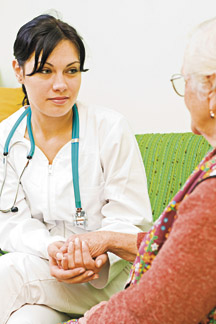Even before Cynthia Alverez of Weehawken takes care of herself in the morning, she has to cook breakfast and get the bath water and a diaper ready – but not for her kids.
Cynthia is, indeed, a mom. But she is not tending to her 14-year-old daughter, Roxanne. She is caring for her 74-year-old mother, Delores.
Alverez, 34, has to juggle married life and her responsibilities as caregiver. “It has been pretty difficult at times,” she said. “I’m just so happy that I have a husband and daughter who are so understanding.”
Alverez’s mother had to move into her apartment about a year ago, because she is no longer able to take care of herself due to advanced Alzheimer’s disease. And as more of Hudson County’s elderly become homebound, more family members are taking on the role of caregiver – having to fit it into their schedule with other jobs and responsibilities.
“In the beginning, my mother’s expectations were to be independent, stay at home, and [pay for] minimal help,” Alverez said. “But that can be very expensive. Family members pitching in can certainly make a difference.”
According to Alverez, homecare has become much more complex than just administering medication and taking blood pressure.
“Our goal is to make our loved ones feel as comfortable as they can be,” Alverez said. “And operating the machines and cleaning the feeding tubes is a part of that.”
A flexible approach is best
Not everybody’s situation is the same. Carmen Nova of Jersey City cares for her mother, Sylvia, 81, who suffers from diabetes. Her mother does not reside with her. Instead, Nova visits her mother every day, many times spending the weekend.
“It’s very hard,” she said. “I have to work and I have to take my kids to school. I have no choice.”
Nova, 45, said that although she has help from a homemaker three to four hours a day for five days a week, her brother and children all help to provide care for her mother, who now has kidney and liver problems.
“My mother now spends one week at home and two to three weeks in the hospital,” she said.
As the social climate changes, so does the care that those in need rely on. Families are spread out much more geographically than they used to be, for various reasons.
Nova’s brother Rafael Polanco, who resides in Flordia, travels to Jersey City every three to four months to visit his mother and help with her care.
Ebersole, 63, is deathly afraid to leave his mother alone.
________
Ebersole, 63, said that he is deathly afraid to leave his mother alone, because of an accident. “My mother went to the bathroom one night,” Ebersole said. “The next thing I know my mother is lying in her own urine.”
Ebersole is retired and is able to care for his mother. His sister-in-law is looking for a place in North Carolina for the both of them to move to.
“You can’t [have] that one-on-one/loved one relationship in a nursing home,” he said. “I want her with me.”
Informal care is the rule
According to recent studies, most Americans will be informal caregivers at some point during their lives. In any given year, there are more than 44 million Americans, 21 percent of the adult population, who provide unpaid care to an elderly or disabled person 18 years or older.
All together, informal caregivers provide 80 percent of the long-term care in the United States.
In addition to that, 61 percent of caregivers are women, most are middle-aged, and 13 percent are 65 and older. Fifty-nine percent of informal caregivers have jobs in addition to caring for another person.
If your loved one suffers from Alzheimer’s disease and you need help or just want to talk or join a support group, please call 1-800-272-3900, or visit this Web site: www.alz.org.
1. Feeling like you have to do it all by yourself.
2. Withdrawing from family and friends.
3. Worrying about the person’s safety.
4. Feeling anxious about money and healthcare decisions.
5. Denying the impact of the disease.
6. Feeling grief or sadness.
7. Getting frustrated or angry.
8. Having health problems.
